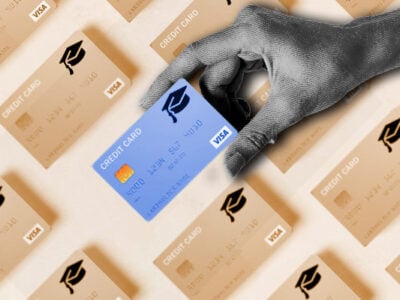If you’re like most recent grads, you’ve been dreaming of taking a relaxing vacation as a well-deserved break after all your hard work. For many, however, such a vacation is just that: a dream.
Traveling is one of the most popular ways to spend time and money. The travel industry is recovering after the pandemic, and the number of people traveling has been on the rise since its major drop in 2020. 1 Many people want to enjoy new sights, experience different cultures, or participate in outdoor activities.
While the travel industry may be recovering, there are plenty of people who still can’t afford a vacation, especially college students. For recent grads, it can be more than a little challenging to see the world while navigating adulthood and living within your means. Still, there are plenty of ways to save money by following these simple tips for cutting down your travel costs.
Table of Contents
Travel during the off-season
One of the best ways to save on travel is to plan your trip for the off-season. This means traveling at less-popular times when there are fewer people vacationing. For example, it may be cheaper to travel in January instead of July. In addition, plane tickets are usually more expensive during holiday seasons, including:
- Christmas
- Thanksgiving
- Spring break
- Fourth of July
- Memorial Day
You can usually save money by avoiding traveling during these periods.
Hotel prices are also typically relatively high during these times. You may notice that hotel rooms cost more per night the closer it gets to the summer or winter holidays. This price hike can sometimes be extreme, especially if you’re looking at visiting a popular destination with many tourists.
How to find out when the off-season is
Bear in mind that prices vary by location and time of year. There might not always be an obvious off-season for the destination you’ve chosen, but you should look into the factors that might influence the price, like weather and cultural events, and check how prices differ from month to month.
For example, if you’re looking to travel to Europe, consider going in the fall when the weather is still mild and the tourist season has died down a bit. Similarly, if you want to go sightseeing in Asia, you might want to plan around Chinese New Year, when plane tickets can get more expensive.
If you’re looking for a beach vacation, traveling in the off-season could mean cheaper airfare and hotel stays as well as smaller crowds at popular resorts.
Wherever you go, be sure to do your research and find out the off-seasons for your chosen destination before booking anything.
Travel to lesser-known locations
Popular locations are often tourist traps. A tourist trap destination is a place where tourists are usually overcharged for goods and services or subjected to unfair or misleading practices. Examples of tourist trap destinations include Times Square in New York City, the Las Vegas Strip, and Fisherman’s Wharf in San Francisco.
These places often have a high concentration of souvenir shops, restaurants, and other attractions designed specifically for tourists. As a result, the prices for goods and services are often much higher than what you would find in other parts of the city.
Instead of traveling to a popular destination, do your research on some lesser-known locations. There are plenty of cities and towns all over the world that few people consider visiting. A beautiful vacation spot might be lesser known for various reasons—maybe it’s too small or remote to attract many travelers.
How to find good alternative destinations
You’d be surprised by how many hidden gems there are around the world. Traveling off the beaten path can help you discover new things and save you money—after all, fewer tourists often means lower prices. Remember that a place doesn’t need to be famous to have beauty or cultural value.
To give you an idea of where to start, here are a few great alternatives to the best-known tourist destinations:
- Colmar, France
- Gothenburg, Sweden
- Telluride, Colorado
- Traverse City, Michigan
- York, United Kingdom
The characteristics that make a place popular can often be found in surrounding cities or similar regions that aren’t as crowded or expensive. You may also find that these less-traveled locations have more or different things to offer.
Book trips in advance
A great way to save on travel expenses is to book your trip well in advance. This means reserving your flight tickets, hotel rooms, and tickets for other activities as early as possible—especially during popular times like holiday seasons.
According to Scott Keyes, founder of Scott’s Cheap Flights, you’ll generally save money by booking your flights sooner rather than later. 2 Airline tickets tend to get more expensive as the departure date gets closer. Hotels also tend to increase their rates as demand goes up. If you’re looking to do any sightseeing or take part in other tourist activities, booking ahead of time can often get you discounts.
Making plans early can be especially helpful if you’re aiming to travel on a specific date or during a popular time of year. Doing a bit of research can help you find the best deals and save you a lot of money overall.
Pack light
If you’re planning on flying, then an important travel hack for any trip is to pack light. Luggage costs can potentially add hundreds of dollars to the price of your flight, so limiting the amount of baggage you take with you can make a big difference to the overall cost of your trip.
Airlines are known to charge for extra baggage or baggage exceeding a specified weight limit. Make sure to weigh your luggage before you arrive at the airport to avoid paying additional fees.
Taking fewer suitcases with you will also leave less room for souvenirs, which can help motivate you to spend less while you’re traveling. Moreover, you’ll likely feel more comfortable on your vacation with less baggage to carry around.
When packing, try to distinguish between things you need and things you can do without. For example, if you’re going on a beach vacation, you probably don’t need a heavy coat. Try to stick to lightweight clothes that can be easily folded up or packed into a small bag. These small decisions can significantly lighten your load.
Stay in hostels
Hostels are designed for travelers on a budget, and they’re typically much cheaper than hotels. You can also find hostels in excellent locations at the heart of a city or near key public transportation routes. Staying in hostels is a great way of cutting costs if you’re willing to sacrifice some of the luxuries and comfort that come with a hotel.
Here’s why you’ll pay less for staying in a hostel:
- More communal spaces: Hostels typically have more shared spaces than hotels do, such as communal kitchens (which allow you to cut costs by cooking instead of eating out), lounge areas, and even bathrooms/showers. You can also pay less by sleeping in a dormitory with other travelers.
- Fewer frills: Hotels often need to be prepared to accommodate people who are traveling for work or who want access to certain facilities and amenities. For this reason, you may end up paying for valet services or gym and spa facilities that you don’t need.
In addition to saving you money on your travels, hostels can allow you to meet new people. Because they’re usually located in prime locations, they can also help you see most of the sights in a town while saving money on transportation. Overall, they’re an excellent way to see amazing places without spending a lot of money.
Try travel hacking
“Travel hacking” means finding cheaper ways to travel by maximizing the rewards and benefits from credit cards. This can include taking advantage of cheap flights, getting free hotel rooms, and collecting credit card miles.
The main benefit of travel hacking is that it gets you free (or heavily discounted) travel as you rack up points or miles for purchases you would have made anyway.
How to start travel hacking
To get into travel hacking, follow these steps:
- Get a travel credit card: Needless to say, the first thing you need to do is get a credit card that offers good travel rewards.
- Use the card regularly: After that, you’ll need to make sure to use your new credit card for all of your regular purchases so that you can rack up points or miles quickly. Make sure to always check the reward charts of your credit cards to see how many points or miles you can earn for different types of purchases.
- Start looking for deals: In particular, you’ll probably be able to find deals on flights, hotels, and rental cars. Your bank’s website may also be a good place to find good travel offers. With some cards, to get the best deals, you’ll need to book your trips through your card issuer’s online portal.
If you’re currently still a student, take advantage of student credit cards that offer travel rewards:
Be careful when applying for travel cards
Travel hacking has one major difference compared with applying for a standard credit card: you’re applying almost solely for the rewards. However, it’s still critical to do your research and due diligence before applying for a card.
When looking for a card, take into consideration your spending habits and any quirks you have that may affect your credit score. For instance, if you tend to use your credit card fairly heavily, you should look for one with a high credit limit to avoid raising your debt-to-credit ratio to levels that could damage your score.
Certain rewards may also only apply if your credit score is in a higher range (in general, getting credit card rewards is one of the benefits of having good credit). Additionally, you may need to have a good credit score to qualify for a travel hacking credit card to begin with.
Manage your finances before traveling
If you’re a recent graduate, then you may have expenses hanging over your head that could potentially affect your long-term financial health, especially your credit. If you fail to pay on time (or at all), all of the following can affect your credit score :
- Student loans
- Credit cards
- Utility bills
- Rent
While this may be the last thing you want to hear, it’s very important to make sure that you’ve made arrangements to cover your current financial obligations before you take a trip. This is even more important for long trips.
There are many ways to get your finances in order before traveling. For example, you can try consolidating your debts, refinancing your student loans, or looking for better deals on your monthly bills. If it seems infeasible to travel after taking steps to manage your debt and expenses, then you may want to wait until you’re more financially stable.
How to protect yourself while you’re traveling
Before you travel, it’s also a good idea to get travel medical insurance. Even if you’re young and healthy, accidents happen, and out-of-pocket medical expenses can set you back big time.
You can get travel medical insurance as a standalone plan or as part of a more comprehensive travel insurance plan. According to Forbes, there are multiple travel medical insurance providers that offer relatively cheap medical coverage.
For example, for $26.46, GeoBlue will offer you coverage for a one-week trip. The plan will cover medical bills of up to $100,000, with a $100 deductible (the amount that you still have to pay out of pocket). Atlas International and IMG Patriot Travel Medical Insurance offer even cheaper plans, at $20.44 and $17.56, respectively. This is especially helpful for travel during the pandemic.
Assess your savings and income. If you’ve managed your finances well and can travel, the tips above will help you have a great trip without going overboard on spending while you’re on vacation.






